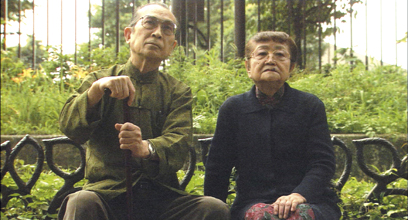Dream Cuisine
Li Ying
Japan 2003

|
Delphi 11.02.2003, 16:00 |
Produktion: NHK (Japan Broadcasting Corporation),
Dragon Films Inc.
Weltvertrieb: Dragon Films Inc., 25th
Kyutei Bldg. #805, 3-13-22 Sendagaya,
Shibuya-ku, Tokyo 151-0051, Japan
Tel.: (81-3) 3405 7888, Fax: 3405 7887
E-mail: info@dragonfilmsinc.com
Kamera: Hotta Yasuhiro
Ton: Utsumi Hiroyoshi
Schnitt: Li Ying, Miyachika Shigenori
Format: 35mm, 1:1.66, Farbe
Länge: 134 Minuten, 24 Bilder/Sek.
Sprachen: Japanisch, Chinesisch
Sato Hatsue is the only Japanese woman to ever be recognised by the government of Shandong Province in China as an official master of Shandong cuisine. Shandong is said to be the original source of Chinese cuisine. Sixty years ago, when she was growing up in China during Second World War, Hatsue mastered the art of this cuisine, which never uses sugar, lard, or MSG. After the war, in 1948, she brought this knowledge to Japan, where she continues to keep the tradition alive to this day – together with her husband Koroku. The Satos are guest lecturers at the ‘Oriental Gourmet College’ in Shandong Province, which they visit once a year. In 2002, their visit turns into a confrontation. Liu Guangwei, the leading proponent of a ‘New Wave’ in the food culture of China, says: ”National cuisine is a culture that must change with the times.” But Koroku declares: ”Cuisine is the stuff of life. ” The trip to Jinan strengthens Hatsue’s determination to return. However, upon returning to Japan, the couple face the realities of everyday life and an unexpected development... “This film is a love story about change and constancy. ‘Love’ is the affection between husband and wife, and also between cuisine and life. It is also the affection between Japan and China, and between traditional culture and contemporary civilisation.” Li Ying
Li Ying, geb. 1963. Seit 1984 Dokumentarfilme für China Central Television. 1989 Übersiedlung nach Japan und Gründung der Dragon Films-Produktion. Im Forum: 2H (1999), Flying, Flying (2000).